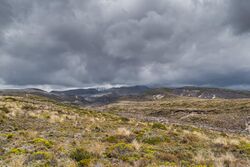Biology:Ichneutica emmersonorum
| Ichneutica emmersonorum | |
|---|---|
| Scientific classification | |
| Domain: | Eukaryota |
| Kingdom: | Animalia |
| Phylum: | Arthropoda |
| Class: | Insecta |
| Order: | Lepidoptera |
| Superfamily: | Noctuoidea |
| Family: | Noctuidae |
| Genus: | Ichneutica |
| Species: | I. emmersonorum
|
| Binomial name | |
| Ichneutica emmersonorum Hoare, 2019[1]
| |
Ichneutica emmersonorum is a moth of the family Noctuidae.[1] This species is endemic to New Zealand. It is very similar to I. similis but its forewings have visual differences. I. emmersonorum is only known from the North Island volcanic plateau. The life history of this species is unknown as are the host species of its larvae however Robert Hoare argues that the likely larval host plant species is a grass or grass like plant. The adult moths are on the wing from November to January. This species is attracted to sugar traps and to light.
Taxonomy
This species was first scientifically described by Robert Hoare in 2019.[2] The male holotype specimen was collected by Hoare, G. Hall, and T. Sirey in December on Whakapapanui Track in the Tongariro National Park at an altitude of 1000 m.[2] This specimen is held in the New Zealand Arthropod Collection.[2] This species is named in honour of Alan and Kath Emmerson.[2]
Description
The adult male of this species has a wingspan of between 33.5 and 36 mm and the female of between 33 and 37 mm.[2] It is visually similar to I. similis but can be distinguished as I. emmersonorum has wider and darker coloured forewing with a less distinct kidney mark.[2] I. emmersonorum also has more distinct black lines along the veins of the forewing.[2]
Distribution
This species is endemic to New Zealand.[3] This species has only been collected in the North Island Volcanic Plateau.[2]
Behaviour
The adults of this species are on the wing from November to January.[2] This species is attracted to sugar traps and to light.[2]
Life history and hosts
The life history of this species is unknown as are the host species of its larvae.[2] Hoare argues that the likely larval host plant of this species is a grass or grass like plant.[2]
References
- ↑ 1.0 1.1 "Ichneutica emmersonorum Hoare, 2019". 2021. https://www.nzor.org.nz/names/2c7cfa6f-8406-4172-a4a7-248e08608cf2.
- ↑ 2.00 2.01 2.02 2.03 2.04 2.05 2.06 2.07 2.08 2.09 2.10 2.11 Hoare, Robert J. B. (9 December 2019). "Noctuinae (Insecta: Lepidoptera: Noctuidae) part 2: Nivetica, Ichneutica". Fauna of New Zealand 80: 1–455. doi:10.7931/J2/FNZ.80. https://www.wikidata.org/wiki/Q94481265.
- ↑ "Ichneutica emmersonorum Hoare, 2019". 2021. https://nztcs.org.nz/nztcs-species/47461.
Wikidata ☰ Q104203291 entry
 |


